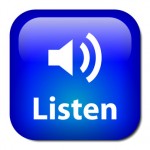 I’ll be honest with you; this isn’t a question I thought a lot about when I suffered from abnormal anxiety.
I’ll be honest with you; this isn’t a question I thought a lot about when I suffered from abnormal anxiety.
I focused more on when my next panic attack was going to strike. Looking back though, I wish I had.
Perhaps I would’ve understood what I needed to do sooner, or not. See, even after I knew what to do I stayed anxious anyway.
It took a long time to go from “I get it,” to “I truly understand.” This, I think, explains why my two eBooks are so different.
I recently had a reader email me this question:
In the first book, you mention several times that we need to challenge anxiety, to fight our way out and to be active in our recovery. But the second book makes great emphasis on acceptance and letting go. How can I do both? It’s probably just a turn of phrase I’m not grasping, but I’d appreciate some clarification. Thanks!
The recovery process can be a fight; at least it was for me. You have to motivate yourself, to move beyond information gathering and into acquiring a true understanding of anxiety and yourself. This can be time consuming, even scary.
That’s why it’s so easy to get discouraged and, despite how lousy it feels, to continue down the path of misery. That’s why you have to fight with yourself to get going and stay going toward recovery.
You have to get beyond false starts and move toward a real commitment to the recovery process. That can be a ‘fight.’
In fact, in my first eBook, How to Stop Anxious Thinking, I outlined all the reasons why you could fail to get better. I did that knowing that a lot of people want to get better but lack the focus and mental stamina they need. It was a warning against every pitfall that I tumbled into as I sought relief myself.
I guess it’s the same reason why many people with weight issues struggle to lose weight. They know what to do, they know the benefits of losing the extra pounds, yet they stay in the same situation. They lose 5 lbs; gain the 5 lbs back, plus 5 more. It’s a fight.
After you recognize AND break through your apathy, stagnation, and routine you’ll start to see change. That’s what I was trying to highlight in my first eBook.
Unfortunately, I barely included the concept of acceptance in my first eBook because my own understanding of how I got better hadn’t fully evolved when I wrote it. It was a long, complex process that only became clear to me long after I got better.
I had grown in ways I wasn’t aware of. I had undergone a process that I didn’t fully understand, so I had to ‘process’ it for a while. This is why I wrote my second eBook, The Big Idea. I wanted to explore this powerful realization.
Given all that, I still think the two approaches can coexist. On the one hand, it is worth your while to understand the obstacles you face, to learn about anxiety, the process of stress, and to challenge old patterns of thinking.
On the other hand, learning how to accept your fears remains the final step, in my opinion, toward resolving the constant inner chatter that keeps you off balance and stuck on ‘What If’ scenarios.
Ultimately, I still think that you build your own solution to this problem.
You build the ‘answer’ over time using information from others (like me), but most importantly, with information from yourself. Only you understand what you really fear and what it’s going to take for you to sit with those fears without a strong response.
Overcoming anxiety is challenging because it has to do with the all the stuff you don’t want to happen in life, like dying. These fears are often unconscious, or at least not so clear in your mind that they represent a cause for concern.
Your job is to find out what your fears are, learn about your reaction to those fears, and then learn how to embrace them. That’s how you get better.
This topic is terrific, so I made a podcast to explore it a bit more. Take a few minutes to listen and comment below!
P.S. You can learn more about my new members website by clicking here.






I feel I am in a circling pattern, I know what to do (at least I think I know) and yet anxiety just pops up out of the blue and hangs around for minutes or days and I cannot ‘see’ what is causing it. I’ve gone over what my thoughts have been prior to any thoughts or feelings of anxiety and I come up empty. I have no clue what is triggering it.
Maybe I am not ‘getting’ how to accept my fears? If there are “what if” scenarios going off in my brain, I am not hearing them. I’ve tried rewording the words “what if”, and still come up empty. Not sure what I am missing.
I don’t even know why I have the fears I have; heights, bridges, flying, driving, sometimes I feel anxiety in the grocery store and don’t know why.
Breaking the ‘routine’, I believe, is key. People are very habit forming creatures. My theory is that our brains, for some reason, have become stuck with the flight/fight switch in the on position. Each time it triggers for a untrue danger, it reinforces that it is correctly warning us of danger. (Pavlov’s dog comes to mind). If the brain can be trained one way, it can be untrained.
Thanks! I’m glad I helped a bit in a way. It is a helpful nuance that you clarify. It’s a hard concept to grasp, but I think practice makes perfect. I’m persevering in not resisting if that makes sense.
🙂
Hey, I like you for a long time looked for all the possible “causes” of my attacks… But I have now realised that for me there isn’t really some specific thought that started it. I think, and I’m no expert, that u would be better off thinking about what you thought AFTER you initially become anxious cause those thoughts will determine whether your anxiety develops or gets worse.
Do not worry though those circular and uncertain thoughts were common with me, I just largely learned to start ignoring them and replacing them with affirming thoughts (I know that doesn’t work for everyone).
Something that helped me, that I think u might like to try, is to write a list of all your problems and everything that’s could or does cause you anxiety. Then go through and REMOVE everything that you can do nothing about (e.g. That you have two heads or something 🙂 ). Then go through all the problems you can deal with a sort them out 1 at a time from easiest to hardest. You can also do this kind of exercise in your head. I found that in my experience my unconscious thoughts would cause physical anxiety. By analyzing my unconscious thoughts I was able to remove the triggers of the anxiety. It didnt work all the time and it might not work for you but I think it’s worth a try. I hope you feel better and remember to laugh, smile and exercise… Make yourself to happy to be anxious haha
williamric,
Thanks for the input, I will work on trying to “think” on what my thoughts were/are as soon as the anxiety kicks in. I have tried it a few times since I read your post. I have noticed, that my thoughts drift towards potential physical ill health.. I wasn’t a hypochondriac in nursing school, not sure why the tendencies are there now. I know I have trust issues, saw a lot of what I felt was substandard in healthcare, maybe that has something to do with that part of my anxiety.
When I’m driving, and the anxiety starts, I don’t know what is causing it. I look around and no other cars are near, clear sunny day. No reason to be anxious.
I do try and remember to tell myself, when the anxiety starts, that it is just the anxiety switch malfunctioning, I look around and see no danger and tell myself so. Don’t know if that is helping, I guess I’m trying to imprint on my self conscious that I am safe.
I will try the list. I know the anxiety is slowly resolving, I can look back at 2 years ago and see that last year was better and that today I am better than I was at this time last year. It has been a slow process. Thank you.
I believe that studying your thoughts in order to try to find your triggers is a counter-productive process. You will just add more tension by trying to work it all out. It doesn’t really matter in the long run why anxious thoughts or symptoms pop up or how often. It can for a few minutes or it can be with you for months on end. Focus on the fact that it doesn’t last 24/7 because the cycle of anxiety doesn’t allow it to. Just let all the thoughts and symptoms be with you for as long as they want because they WILL go away on their own without you analyzing all your thoughts or practicing affirmations, etc. Acceptance is the BIG key to recovery. I agree with Paul in that understanding what anxiety is and how it operates in our bodies is a huge step in feeling better, but you also have to allow your body to have this response without getting TOO worked up over it. You’ve trained yourself to be this way and you can absolutely train yourself to reverse the anxiety process, too. Face your fears with understanding (it is just the product of a tired mind and nervous system and NOTHING about anxiety can harm you – period.) Allow all the thoughts and symptoms to rage for the moment without trying to control them – you can’t. They won’t hurt you and will eventually get bored and leave you. Also remember that this process takes time. You didn’t just wake up anxious one day even if that is what it felt like at the time. It took a long time for you to get into this sensitized state and you will have to have both patience and understanding to travel out of the sensitized state. An additional resource that put everything Paul has said into perfect perspective is the Freedom From Fear Recovery Method. This method has taught me that anxiety is something that you can absolutely recover from if you just step out of your own way and let your mind and body do it’s own thing without trying to control it.
I too suffer from anxiety/panic disorder due to various health issues.What techniques or approach do you recommend when it manifests into unwanted palpitations as they are debilitating enough?
Do anxiety make you feel… “Not yourself ” like almost unreal !!? I need answers because I am scared and I do have panic and anxiety attacks?
haven’t been receiving your blog emails anymore. am I still on your list of recipients?
Please put me on your mailing list. Anxiety is pushing me over the edge and I need some ideas, tools, new ways of thinking, help and support.
Hi Julianne,
I just added you to my list to make sure that you receive updates. Thanks!
I jave agoraphobia. A year ago I started having palpitations after physical effort. I didn’t pay attention at first. Hey were thyroid-related. After I discovered the thyroid issue which caused me palpitations and panic attacks it still took a while to recover because the thyroid meds don’t have results in less than three months. Anyway, the problem is each time I go to work, i am in the subway or in a store I remember the tachycardia episodes which happen there. I take small dose of xanax – 0,30 mg, GABA supplement and propranolol to block adrenaline but the thoughts drive me crazy.
I can’t stop thinking of the tachycardia I had when I couldn’t even climb a few stairs without my heart pounding. I am healthy now but these episodes triggeredy anxiety and I can’t stop thinking about them.
I suggest to all anxiety sufferers to have their thyroid checked. Mine was in the normal range, but the symptoms were devastating. Only one doctor suggested I may be sick despite normal results.( after testing prolactin and adrenals). I improved my condition with magnesium supplements but I still feel frightened by crowded places, large arreas. I used to be active and walk a lot, now I try to preserve my energy for fear of tachycardia.
If you have any agoraphobia success story, please share
I had my first anxiety attack about a month ago and have been feel tense in the neck and head since. Most of my anxiety stems from worrying about my health. So experiencing these symptoms is very stressful. I had no idea what was going on with me and still have mini anxiety attacks the more I focus on the physical symptoms. I’ve started doing yoga in hopes that these physical symptoms subsides. I am happy that I’ve found this site as it gives me some relief and hope.